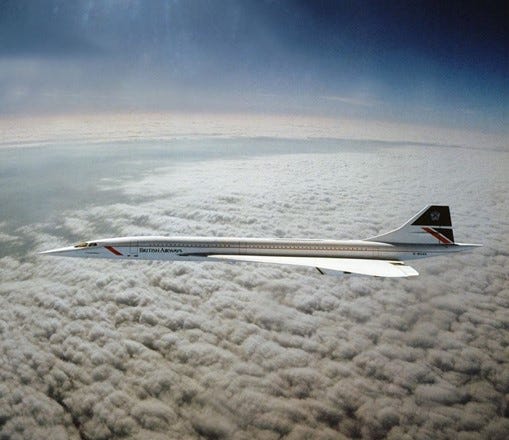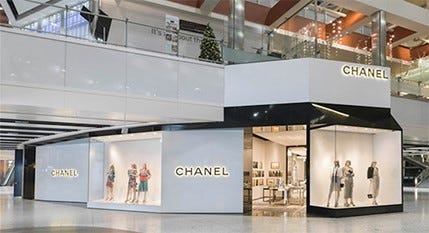Whilst I would love to claim I was working class, and that I come from a long line of revolutionaries and union organisers, I am in fact terminally middle class. I did not go to a private school, and my mum was (and is) a social worker, but my dad who is now retired was a pilot for British Airways, and we were always squarely in the social middle.
One of the high points of my dad’s career was that in the 1980’s he was a co-pilot on Concorde.
Concorde was an incredible machine- it flew at over twice the speed of sound and could fly from London to New York in around 3 hours- so passengers literally flew back in time, arriving two hours before they left. It carried 100 passengers in total. It flew so high, at 17,000 metres (56,000 feet) twice as high as a typical airliner, that the curvature of the earth was clearly visible. Whilst the temperature outside was minus 57 degrees centigrade, it flew so fast that the front of the plane reached a temperature of 127 degrees C. The photo below, the only one of Concorde flying supersonically, was taken by a military jet- but military jets could only manage this speed for a few minutes whereas Concorde could keep going for hours at a time.
Tickets were around $12,000 for a round trip. This was a plane that served the global elite.
Concorde entered service to the USA in 1976, which the inequality geek in me has always found a little strange- that this supersonic plane for the super-rich came into service at basically the most equal moment in the history of the US and the UK. The wealth of the top 1% in the USA reached its nadir at around exactly that moment.

Concorde flew for the last time in 2003. Despite the huge rise in wealth inequality and the number of billionaires since then, it has never been replaced.
Maybe the answer is that in a way Concorde anticipated the neoliberal era and heralded the end of the decline in inequality that had characterised much of the rich world after WW2.
Socialist Concorde
Whilst that is true, I think maybe in fact Concorde was just a bit too egalitarian to survive. Dad has lots of stories of the various famous people he met travelling on the plane; a typical flight might have a couple of film stars (Joan Collins was a regular), opera singers, a few politicians (who travelled incognito to avoid bad headlines) and a regular set of bankers from the City of London on their way to Wall Street. It was a bit of a Davos in the sky really- Dad said there was ‘a lot of networking that went on’.
It is really hard to imagine today a scheduled flight, where you have to buy a ticket, that the super-rich would regularly take. Imagine Bill Gates and Larry Fink discovering they were sitting in very cramped seats next to each other and just behind Tom Hanks; Bill having to climb over Larry to go to the toilet mid-flight, or Larry falling asleep on Bills shoulder and drooling a little. But that was exactly how it worked.
These days in the late neoliberal era that all sounds, well just a little bit socialist really. Nowadays I suspect most of them would travel in their own private jets.
Flying and the 1%
Despite the demise of Concorde, and the huge expansion in air travel, flying remains an extremely elite pursuit. Only 4% of the world’s population take international flights each year. Huge proportions of humanity have obviously never flown, and even very large proportions of the population of rich countries- 65% of Germans and 53% of British people for example.
The top 1% of the most frequent fliers account for more than half the total emissions from air passenger travel. Sales of private jets are set to reach their highest level ever this year. There were more than 5.3 million private flights in 2022. Greenpeace found that emissions from private jets have more than doubled in Europe reaching a total of 5.3 million tonnes of CO2 in the last three years, more emissions than the whole of Uganda.
As we speak, private jets are all zooming to Dubai for the UN Climate talks. Our own UK Prime Minister who recently approved new drilling for oil and gas, flew there by private jet for half a day to make a speech about his green credentials. King Charles also went, in a separate private jet. The event is expected to have the highest carbon footprint ever for a UN climate meeting.
It does always amaze me the incredible airports being built all over the world in recent decades. Spectacular buildings, with cutting edge architecture and technology. Airports are like railway stations in the 19th and 20th centuries- modern day temples to technology and transport. But unlike railways they are not transportation for the masses at all really- they are largely for the benefit of the global elite.
Even for that small proportion of humanity that does fly, inequality is a core part of the actual experience. On the plane class segregation is made very carefully made clear to you as you walk past all the business class passengers in their flat beds, already sipping champagne as you work your way down the back to economy class. Within the airport too there is such strong differentiation, with lounges for the business class passengers, and even posher ones for first-class. In London we even have separate airports like London Stansted for the cheap, bargain airlines like Ryan Air, rather than London Heathrow for the more reassuringly expensive standard airlines like British Airways.
My dad said in the original plans for Concorde it was supposed to have an economy cabin- the dream of its designers was to make supersonic flight available to all- which was a laudable aim. I do think the ability to travel to other countries by plane is incredible, and everyone on Earth should have that opportunity. It should not be the preserve of the super-rich, any more than railways or motor cars. At the same time, unless and until we find some sustainable way of flying, it remains a hugely wasteful way to burn what little carbon we have left if we are to avoid climate breakdown- and like carbon overall, it is being recklessly squandered by a small group of very rich people.
ENDS.
Author: Max Lawson, Head of Inequality Policy at Oxfam International and EQUALS podcast co-host. He is also the co-chair of the Global People’s Vaccine Alliance.
EQUALS Podcast is now back with a new season and a new guest. In our first episode, Nafkote Dabi and Max Lawson interviews Astrid Nilsson Lewis and Ashfaq Khalfan on the Oxfam’s latest Climate Inequality report. Have a listen here and watch out for the upcoming episodes.







